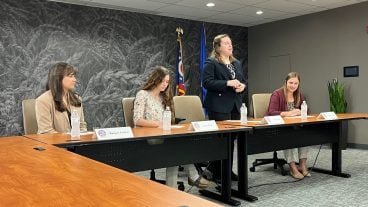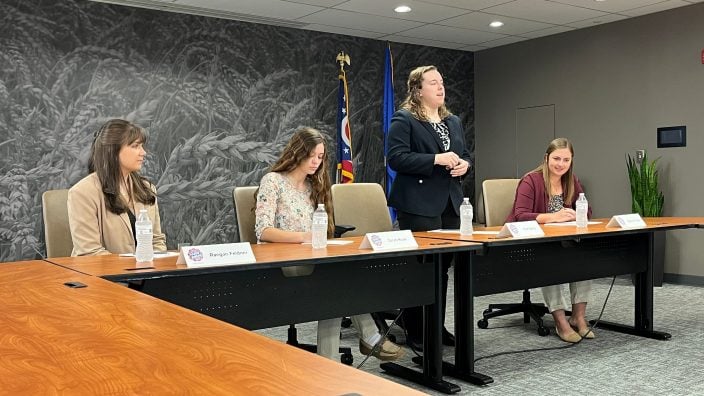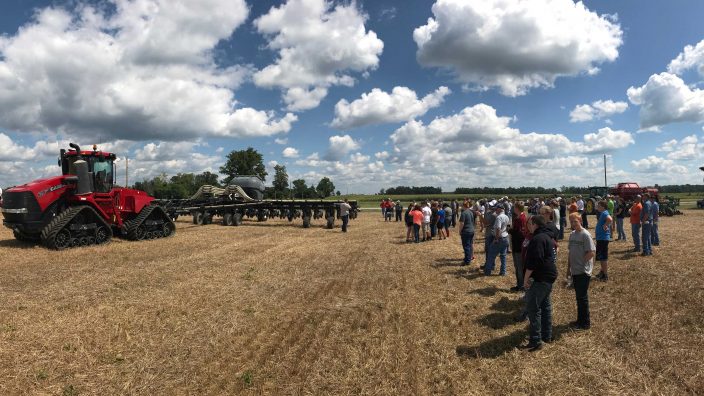Applications for Ohio Farm Bureau Health Plans now available
Members have three ways to apply: contacting a certified agent, calling 833-468-4280 or visiting ohiofarmbureauhealthplans.org.
Read MoreTake a whole class or just take the test, which is better? Farmers will get to decide.
Those who apply fertilizer on 50 or more acres now have the option to take an exam or attend a three-hour course to get the required certification aimed at protecting water quality.
The exam is a new option the Ohio Department of Agriculture will offer to make it easier for farmers to get certified and yet ensure that those who are applying fertilizer know the safest measures. The exam option was one of the rule changes on fertilizer certification that went into effect Oct. 1.
The other changes include the following:
Since Sept. 30, growers who apply fertilizer to more than 50 acres have been required to be certified, a measure aimed at keeping nutrients from farm fields from contributing to algal blooms in Lake Erie and other bodies of water. Phosphorus and nitrogen in fertilizer can trigger the growth of algal blooms. Those blooms produce toxins in the water, making it unsafe to swim in or drink. And as the blooms decompose, they take oxygen from the water, depleting the supply available for other aquatic life. The extent of 2017 algal blooms in Lake Erie was the fourth most severe in a century, according to a November report from the National Oceanic and Atmospheric Administration.
All the recent changes are aimed at making the certification process less burdensome on farmers, said Peggy Hall, agricultural and resource law field specialist for Ohio State University Extension, the outreach arm of the College of Food, Agricultural, and Environmental Sciences at The Ohio State University.
OSU Extension provides training for applying fertilizer, focusing on teaching how to apply fertilizer at the correct rate, time and location in the field, to keep nutrients in the field and available to crops while increasing stewardship of nearby and downstream water resources.
“The goal of the entire program is that we constantly educate ourselves about how we are applying these fertilizers and make sure we understand the science behind it,” Hall said.
“Hopefully more education, more understanding and continued research will help with the runoff issue.”
Across Ohio, an estimated 3,700 private fertilizer applicators have certificates expiring in March 2018, according to records from the Ohio Department of Agriculture.
OSU Extension will begin offering recertification programs in nearly every county this fall and winter, said Mary Ann Rose, program director for OSU Extension’s Pesticide Safety Education Program.
“Most of the fertilizer recertification programs will be offered in combination with pesticide recertification meetings; farmers will have the option to attend either or both,” Rose said.
For more information, visit ODA’s website or nutrienteducation.osu.edu.


Members have three ways to apply: contacting a certified agent, calling 833-468-4280 or visiting ohiofarmbureauhealthplans.org.
Read More

Collegiate Farm Bureau serves as a connection to current industry professionals and equips the next generation with the essential tools and resources needed to excel in their careers.
Read More

Ohio Farm Bureau members met one-on-one with state legislators and staff to discuss policy priorities impacting Ohio’s farms and rural communities.
Read More

Legacy nutrient deductions enable new farmland owners to claim deductions on the nutrients within the soil on which healthy crops depend.
Read More

Farmers, agribusinesses and community members are encouraged to nominate their local fire departments for Nationwide’s Nominate Your Fire Department Contest through April 30.
Read More

Introduced by Sen. Paula Hicks-Hudson, SB 120 would establish the Urban Farmer Youth Initiative Pilot Program.
Read More

Gases, vapors, and fumes can all create risk. How can we measure and protect ourselves from them?
Read More

The Ohio Farm Bureau’s Young Agricultural Professionals State Committee has named its 2026 leadership and the individuals who will be serving on the state committee for 2026-2028.
Read More

The Ohio Farm Bureau Foundation has multiple scholarships available to Ohio students from rural, suburban and urban communities who are pursuing degrees with a connection to the agricultural industry.
Read More

With 100% bonus depreciation now permanent, farmers can deduct the full cost of a new agricultural building in the year it’s placed in service.
Read More